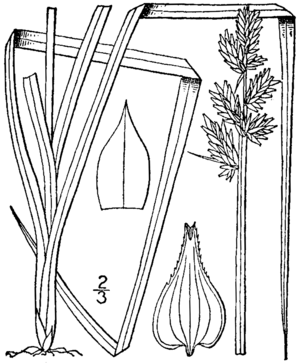Carex conjuncta facts for kids
Quick facts for kids Carex conjuncta |
|
|---|---|
 |
|
| Illustration from 1913 | |
| Scientific classification |
|
| Kingdom: | Plantae |
| Clade: | Tracheophytes |
| Clade: | Angiosperms |
| Clade: | Monocots |
| Clade: | Commelinids |
| Order: | Poales |
| Family: | Cyperaceae |
| Genus: | Carex |
| Section: | Carex sect. Vulpinae |
| Species: |
C. conjuncta
|
| Binomial name | |
| Carex conjuncta Boott
|
|
| Script error: The function "autoWithCaption" does not exist. | |
| Synonyms | |
|
|
Script error: No such module "Check for conflicting parameters".
Carex conjuncta, also known as soft fox sedge, is a type of grass-like plant called a sedge. It was officially named in 1862 by Francis Boott. This plant grows naturally only in the central and eastern parts of the United States.
What Does Soft Fox Sedge Look Like?
Carex conjuncta is a plant that grows in clumps. It is a perennial, meaning it lives for more than two years. Old dried stems from previous years stay around the plant's base.
This sedge typically grows about 40 to 80 centimeters (about 1.3 to 2.6 feet) tall. Its stems are strong but soft. They are usually 2 to 4 millimeters wide, but can be up to 10 millimeters wide.
The plant has small, sac-like structures called perigynia. These are about 3 to 5 millimeters long and half as wide. They are widest at the bottom and narrow into a pointed, toothed tip. Inside the perigynia are the seeds, called achenes. These seeds are tiny, about 2.2 millimeters long and 1.4 millimeters wide.
Where Does Soft Fox Sedge Grow?
The soft fox sedge is found naturally in the United States. Its range stretches from New York in the east to Minnesota and South Dakota in the west. It also grows south to Virginia and Kansas.
This plant is not very common in most of these areas. However, it is more often seen in the middle of its range, especially in Missouri and Illinois.
What Kind of Places Does It Like?
Carex conjuncta prefers damp places. You can find it in wet woods, swampy areas, and wet meadows. It also grows along the edges of marshes.
In Minnesota, this sedge is found in only a few spots. It grows in forests along rivers, like in the Cannon River Valley. It was first discovered there in 1976.
In Minnesota, it likes moist forests with trees like American elm, black walnut, and silver maple. These forests often flood in the spring. The soil stays very wet throughout the growing season. Other rare plants, like Carex davisii and Carex grayi, sometimes grow near Carex conjuncta in Minnesota.

